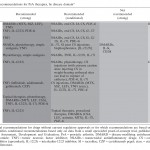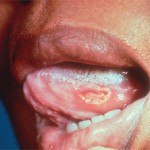A 55-year-old female patient returns for her second infliximab infusion. Her temperature is 98°F, her height is 5’6″ and her weight is 151 lbs. She received 210 mg infliximab via infusion. The patient arrived at the clinic at 8:15 a.m. and left at 10:55 a.m. Can this encounter be coded correctly? Yes No A 38-year-old…
Search results for: Gout

2015 Treatment Recommendations for Psoriatic Arthritis
Psoriatic arthritis (PsA) is remarkably diverse in presentation and course. To assist clinicians in its management, the Group for Research and Assessment of Psoriasis and Psoriatic Arthritis (GRAPPA) published treatment recommendations in 2009 based on a systematic evidence review. To be clinically relevant, such recommendations must be dynamic, and significant developments in PsA pathophysiology and disease assessment, particularly regarding the important contribution of comorbidities coupled with major therapeutic advances, necessitated an update of the GRAPPA recommendations…

Trying to Parse True Meaning of Pain Can Be Challenging for Rheumatologists
Discussing aching joints, sore muscles and tender limbs is all in our day’s work. We are rheumatologists; we deal in misery. But trying to parse the true meaning of these terms is among the most vexing of clinical challenges.

Diagnosis Can Be Elusive for Fever of Unknown Origin
Settling into room 501 at Maine Medical Center, Mrs. N was on her way to the bathroom when she felt it coming on. One moment she was okay; the next, her chest felt damp and cold, even as her face flushed and her temperature spiked. Her forehead glistened beads of warm sweat. She felt the…

How Rheumatologists Can Find, Develop Their Specialty Niche
Many rheumatologists chose the profession because they wanted to delve more deeply into rheumatic diseases than internal medicine calls for. “For most, this level of specialization is sufficient and worthy of a lifelong devotion and commitment,” says S. Sam Lim, MD, MPH, associate professor, Medicine and Epidemiology, Emory University School of Medicine, Atlanta. “However, some…
Rheumatology Coding Corner Questions: ICD-10 Coding Guidelines, Conventions Refresher Quiz Part 2
A patient returns for a follow-up visit of their chronic idiopathic gout without tophi with complaints of pain and tenderness. After a thorough examination, the rheumatologist treats the patient for an acute flare of the left knee. How is this coded? M1A.1620, M10.062 M1A.1620 M10.061 M10.062 From ICD-10 coding guidelines, what are the steps to…
Rheumatology Coding Corner Answers: ICD-10 Coding Guidelines, Conventions Refresher Quiz Part 2
Take the challenge. D—Even though the patient’s chief complaint is for a follow-up of chronic idiopathic gout without tophi, the patient is presenting with an acute flare of idiopathic gout of the left knee. Acute gout and chronic gout have specific coding guidelines, because they each have an Excludes 1 note. This indicates they are…

2015 ACR/ARHP Annual Meeting: Behçet’s Disease Poses Diagnosis, Treatment Challenges
SAN FRANCISCO—Behçet’s disease is a vasculitis that can be hard to pin down, with a wide variety of manifestations, many of which overlap with other auto-inflammatory conditions, an expert said at a clinical review course at the 2015 ACR/ARHP Annual Meeting. The most common feature is oral ulcers, which are expected to be seen at…

Gut-on-a-Chip Provides Insight into Microbiome & Intestinal Inflammation
Researchers have created a microdevice with Caco-2 intestinal epithelial cells to aid in studying the human gut microbiome’s role in homeostasis, immune modulation and pathology. Using this gut-on-a-chip, researchers were able to examine in detail the processes they think result in chronic intestinal inflammation…

FDA Approves New Drugs for Pain
FDA Updates Belbuca, buccal-administered buprenorphine, has received U.S. Food and Drug Administration (FDA) approval for treating severe chronic pain.1 The dosage form is a dissolving film that is absorbed through the inner lining of the cheek for chronic pain management. It’s expected to be commercially available in the first quarter of 2016. Seven dosage strengths…
- « Previous Page
- 1
- …
- 39
- 40
- 41
- 42
- 43
- …
- 60
- Next Page »